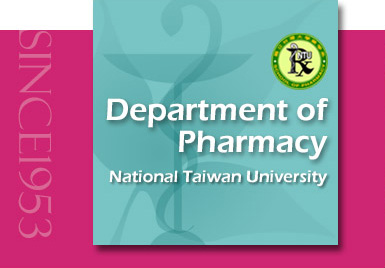  | |
| Education | : | 1992/09~1996/06 Ph.D. Pharmacology N.T.U.
1990/09~1992/06 M.S. Pharmacology N.T.U.
1986/09~1990/06 B.S. Pharmacy N.T.U. | | Experience | : | From 2010/Aug Professor, School of Pharmacy, NTU
2008/Jul~2009/Jul Visiting Associate Professor, The Ohio State University
2004/8~2010/Jul Associate Professor, School of Pharmacy, NTU
2000/2- 2004/7 Assistant Professor, School of Pharmacy, NTU
1996/10-2000/1 Post-Doctor, Drug Development and Research Center, NTU | | Research Areas | : | Mechanism research of anticancer drugs | | Lab Focus | : | We focus the research interests on the development of anticancer agents. We have developed an assay system to do a large scale of screening tests to discover potential agents against cancers. In recent years, we have screened more than 4000 samples from both chemically synthetic compounds and natural products. The mechanisms of the anticancer abilities of effective compounds were studied in this program. Accordingly, a lot of cellular signals being targeted by these compounds have been identified, such as Cdk/cyclin complexes, Cdk inhibitors (p21 and p27), tubulin, topoisomerases, AMPK, ER stress and DNA damage response. Take antroquinonol as an example. Antroquinonol that was isolated from Antrodia camphorate, a well-known Traditional Chinese Medicine for treatment of liver diseases, displayed effective anticancer activity against numerous hepatocellular carcinoma cell lines. Antroquinonol is capable of stimulating AMPK activation, inducing the assembly of tuberous sclerosis complex (TSC)-1/TSC2 and leading to the blockade of cellular protein synthesis through inhibition of protein phosphorylation including mTOR (Ser2448), p70S6K (Thr421/Ser424 and Thr389) and 4E-BP1 (Thr37/Thr46 and Thr70). The inhibition of mTOR signaling pathway leads to the cell-cycle arrest at G1 phase which, ultimately, causes apoptotic cell death. | | Research Subjects | : | 1. Pharmacological evaluation of anticancer activity of chemically synthetic compounds and natural products.
2. Mechanism study of anticancer agents. |
|


